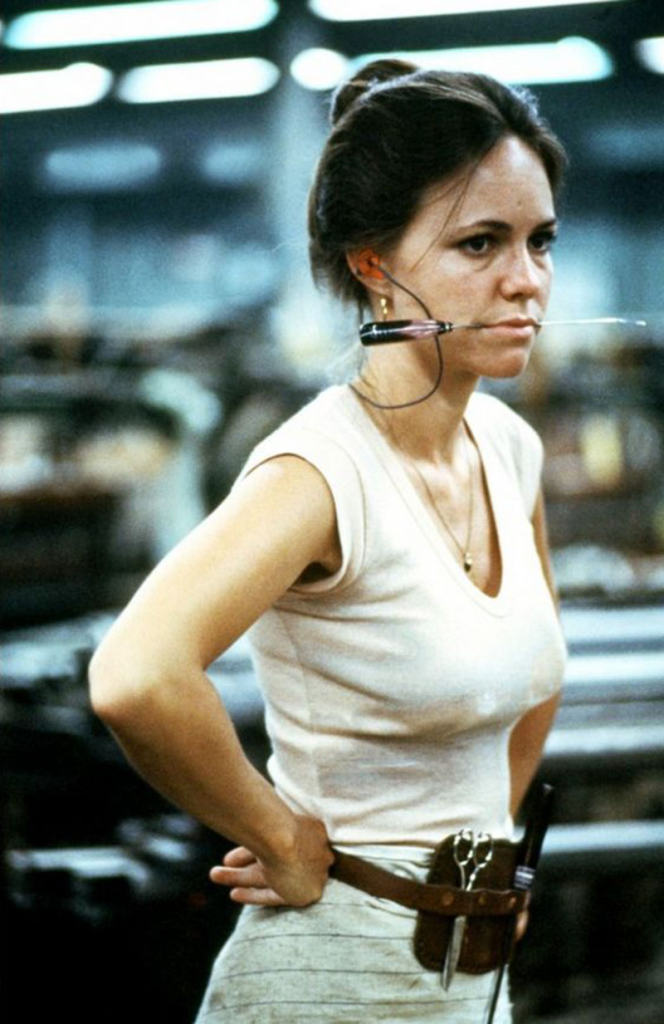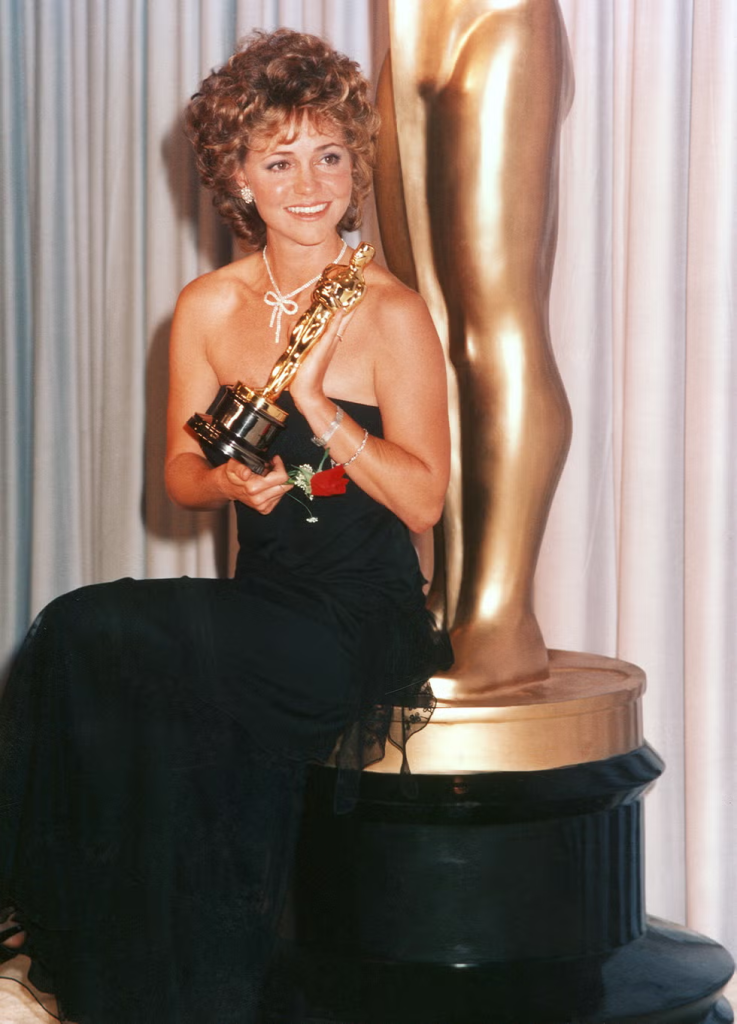Sally Field’s performance in Norma Rae (1979) is one of the most celebrated in film history. Her portrayal of a determined textile worker fighting for labor rights earned her an Academy Award and solidified her place among Hollywood’s elite actresses.
But behind the triumph was a journey marked by emotional turmoil, self-doubt, and even physical pain. Field’s path to Oscar glory was not an easy one, and the price she paid for the role was far greater than most people realize.
Breaking Free from Hollywood’s Stereotype

Before Norma Rae, Sally Field struggled to be taken seriously in Hollywood. She was known for lighthearted TV roles in Gidget and The Flying Nun, and despite her talent, she was often typecast as the “cute girl next door.”
She knew she had to break out of that mold, but doing so required a role that would challenge perceptions. Norma Rae was that opportunity. However, taking on such a powerful role meant going against the advice of those closest to her—including her then-boyfriend, Burt Reynolds.
Burt Reynolds’ Disapproval and Control
Reynolds was one of Hollywood’s biggest stars at the time, and his relationship with Field was highly publicized. But behind closed doors, their romance was anything but perfect.
When Field was offered the role of Norma Rae Webster, Reynolds was far from supportive. He reportedly told her, “No lady of mine is gonna play a whore.” When she tried to explain the significance of the role, he mocked her, dismissing her ambition and questioning her talent.
Despite his disapproval, Field moved forward with the role. The more she embraced her character’s strength and independence, the more she found herself growing in real life—a change Reynolds did not welcome.
A Proposal at the Worst Possible Moment
As filming came to an end, Field was stepping into her own power. She had found confidence in herself as an actress, proving that she could carry a film on her shoulders.
Perhaps sensing her growing independence, Reynolds made a grand gesture—he showed up on the last day of filming and proposed.
Field recalled feeling disconnected from the moment, describing it as “not me.” She didn’t accept the proposal, leaving the exchange awkward and unresolved. It was a clear sign that their relationship was unraveling, and Norma Rae had played a role in her realization that she needed to break free.

The Brutal Preparation for Norma Rae
To make her performance as realistic as possible, Field fully immersed herself in the world of textile workers. She didn’t just act—she lived the role.
She spent two weeks working in a real textile mill, experiencing firsthand the physical and emotional toll of the job. The constant vibrations of the weaving room made her feel seasick, and the deafening noise made it nearly impossible to think.
The grueling conditions took a toll on her body, but she refused to back down. She wanted to understand the real struggles of the workers she was portraying.
Filming in an Authentic Southern Mill Town
While the real events that inspired Norma Rae took place in Roanoke Rapids, North Carolina, the movie was filmed in Opelika, Alabama. The local community played a significant role in the production, with real mill workers appearing as extras.
The setting added to the film’s authenticity, but it also came with challenges. The constant hum of machinery made capturing dialogue difficult, and the extreme heat inside the factory was almost unbearable.
Despite the challenges, Field gave a career-defining performance, proving once and for all that she was more than just a sitcom star.
Crystal Lee Sutton: The Real Norma Rae

The character of Norma Rae was based on Crystal Lee Sutton, a textile worker and union activist who fought tirelessly for labor rights.
Sutton’s story was one of courage and resilience. She was fired from her job at the J.P. Stevens plant for advocating for workers’ rights, and her stand against the company became legendary.
One of the most famous moments in the film—where Norma Rae stands on a table holding a sign that says “UNION”—was inspired by a real event. Sutton had done the exact same thing in her fight to organize textile workers.
Despite the success of the movie, Sutton was frustrated with how her story was portrayed. She felt the film turned her real-life battle into a Hollywood drama, downplaying the harsh realities of the labor movement.
A Hard-Fought Oscar Win
When Norma Rae premiered at the Cannes Film Festival, the audience gave Field a standing ovation. But she wasn’t convinced she had done enough.
She later admitted that when she watched the film for the first time, she was overwhelmed with fear. She worried she wasn’t strong enough to hold an audience’s attention for an entire movie.
But when Oscar night arrived, all doubts vanished. Field took home the Academy Award for Best Actress, a moment that cemented her as one of Hollywood’s most respected talents.
The Personal Cost of Success

While winning the Oscar was a career triumph, Field’s personal life was in turmoil. Her relationship with Reynolds continued to deteriorate, and their differences became impossible to ignore.
When she told Reynolds she was attending the Cannes Film Festival, he dismissed it as a waste of time, scoffing, “You don’t expect to win anything, do you?”
His jealousy and controlling nature became even more evident when he refused to accompany her to the Academy Awards. Instead, her friend David Steinberg and his wife stepped in to make sure she had a celebratory night.
By the time Field won the Oscar, it was clear that her relationship with Reynolds was beyond repair. The strength and independence she had gained through Norma Rae had given her the courage to finally walk away.
The Legacy of Norma Rae

More than four decades later, Norma Rae remains a powerful film that continues to inspire audiences. It’s not just a story about one woman’s fight for justice—it’s a testament to the resilience of workers everywhere.
Field’s performance set a new standard for actresses in Hollywood, paving the way for strong female-led films like Erin Brockovich and Silkwood.
But behind the scenes, Norma Rae was more than just a movie for Field. It was a defining moment in her life, one that forced her to break free from expectations, embrace her own power, and finally step into the spotlight on her own terms.
Final Thoughts
Sally Field’s journey to Oscar glory was anything but glamorous. It was filled with emotional struggles, physical sacrifices, and the painful realization that she had to leave behind a toxic relationship.
Her role in Norma Rae wasn’t just about acting—it was about transformation. She didn’t just play a strong woman; she became one.
And in doing so, she gave the world a performance that will never be forgotten.